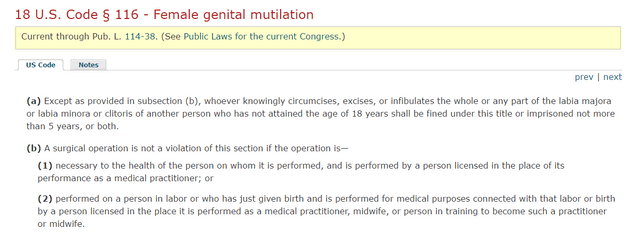Female Genital Mutilation: Cultural Practice, or Child Abuse?

Female genital mutilation, or “FMG” — this is a topic that is more and more openly discussed as a serious health and social crisis, affecting millions of women and girls worldwide. But we tend to think of it taking place only far away, and in very different cultures than ours — not in the United States.
Yet it turns out that the procedure is indeed taking place in America — among several immigrant communities. While it is Federally banned — female genital mutilation is a Federal crime, punishable by up to five years in prison — the reality is that state by state, it may not be illegal. Only twenty-six states in the US have officially banned the procedure at the state level. Indeed, the practice is growing. According to Newsweek, “the number of women and girls at risk for female genital mutilation (FGM) in the United States has more than doubled in the past 10 years.” Generally, as The Daily Beast outlines, the females are cut any time from infancy up to their fifteenth year, yet in some rare cases, “women up to age 49 have been thus mutilated.” In earlier cases brought to trial, defendants have been allowed to cite religion and culture as a defense. Proponents of the legislation claim that female genital mutilation is a barbaric procedure with no health benefits, solely aimed at controlling girls and women. Critics of such legislation have argued in the past that this practice is a cultural and traditional one and is not a matter for state intervention.

Michigan is the newest state to implement laws to make female genital mutilation a felony. The laws will take effect in October 2017. The penalties are far more severe than they were under the Federal law. According to NBC, under the new Michigan laws, “doctors, parents and others involved in female genital mutilation in Michigan will face up to 15 years in prison.”

The drive to pass the new Michigan laws was triggered by a Federal case that connected six people to the genital mutilation of two girls from Minnesota and four girls from Michigan — aged seven through eleven. These adults were connected to a Muslim sect, Dawoodi Bohra, which is based in India. The mutilation was carried out by a doctor in the suburbs of Detroit.
Governor Rick Snyder of Michigan, (R-MI), a Republican, stated that “this legislation is an important step toward eliminating this despicable practice in Michigan while empowering victims to find healing and justice.” Critics of the practice welcome the leadership on the issue shown by Rep. Snyder. Michigan lawmakers say that the Federal penalty is not a strong enough deterrent.
The laws apply to those who, as NBC describes, “knowingly facilitate genital mutilation, including by transporting girls to another state for the procedure. Defendants in such cases will not be able to defend themselves in court by saying it is a custom or ritual.” The new Michigan laws give prosecutors more time than they used to have, to pursue cases of female genital mutilation, in addition to creating harsher penalties for such procedures.
Victims of mutilation will be able to sue the perpetrators up to their twenty-eighth birthdays – which is longer than the previous two-year window that victims had had, in which to bring charges.
In addition to the Michigan bill, there is new programming to stop the practice as well. The Michigan State Department of Health and Human Services will develop an educational and outreach program targeting specific populations, including reaching out to girls who may be at risk. Teachers, physicians, and police also will receive information,” NBC reports.
The bill package, signed by Governor Snyder, demonstrates that female genital mutilation, even in a country such as the United States, is likely to be taken more seriously. Supporters are also looking for copycat bills in others States.
Do you think this bill package is intervening in the private cultural and religious practices of immigrant communities? Or do you think it is a form of child abuse and should be a matter for government intervention? (Equality Now, an organization advocating equal rights for women, lists additional actions critics of the practice can take to make a difference.)
Tweet Gov Snyder, and have your say.



